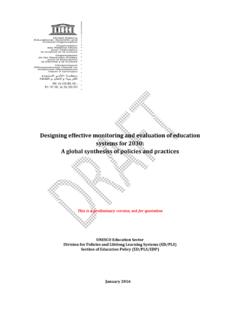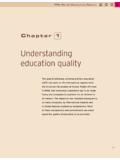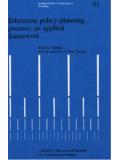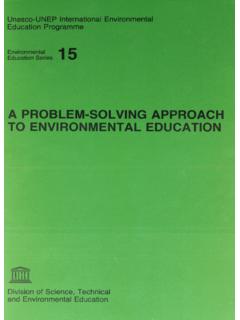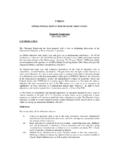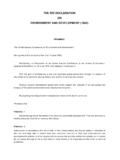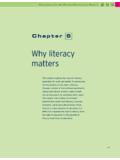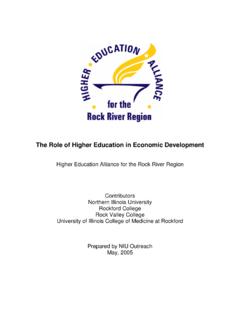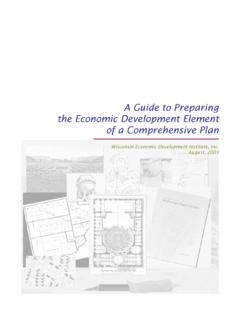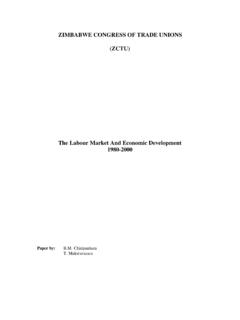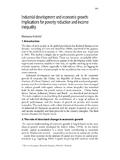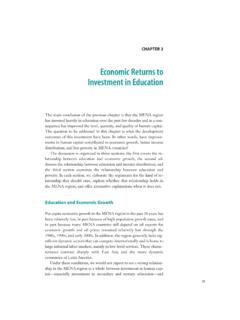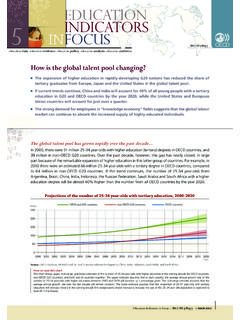Transcription of The impact of education quality on development goals
1 1. The existing literature, whether in economics or in education science, has focused on educational outcomes rather than inputs and processes, and indeed on one type ofoutcome only: cognitive skills. Accordingly, most of this chapter focuses on cognitiveachievement, though it also mentions the importance of non-cognitive skills and otheroutcomes of schooling whose value is increasingly These results are derived from different approaches, but the underlying analysis involves estimating a standard Mincer earnings function and adding a measure of individual cognitive skills.
2 This approach relates the logarithm of earnings to years ofschooling, experience and other factors that might yield individual earnings differences. The clearest analyses are found in Bishop (1989, 1991), O Neill (1990), Grogger and Eide(1993), Blackburn and Neumark (1993, 1995), Murnane, Willett and Levy (1995), Neal andJohnson (1996), Mulligan (1999), Murnane et al. (2000), Altonji and Pierret (2001), Murnaneet al. (2001) and Lazear (2003).3. One standard deviation increase from the mean would be an achievement levelequivalent to the eighty-fifth percentile of the distribution; 15% of students wouldnormally achieve higher test scores than this.
3 Murnane et al. (2000) provide evidence fromthe High School and Beyond study and the National Longitudinal Survey of the High SchoolClass of 1972. Their estimates suggest some variation, with males obtaining a 15% increaseand females a 10% increase per standard deviation of test performance. Lazear (2003),relying on a somewhat younger sample from the National education Longitudinal Study of 1988, provides a single estimate of 12%. Similarly, Mulligan (1999) finds 11% for thenormalized Armed Forces Qualification Test score in the National Longitudinal Survey of Youth Altonji and Pierret (2001) find that the impact of achievement on earnings grows withexperience partly because the employer has more chance to observe impact of education qualityon development goalsIt is commonly presumed that formal schoolingis one of several important contributors to theskills of an individual and to human capital.
4 It isnot the only factor. Parents, individual abilitiesand friends undoubtedly contribute. Schoolsnonetheless have a special place, not onlybecause education and skill creation are amongtheir prime explicit objectives, but also becausethey are the factor most directly affected bypublic policies. It is well established that thedistribution of personal incomes in society isstrongly related to the amount of educationpeople have had. Generally speaking moreschooling means higher lifetime incomes. Theseoutcomes emerge over the long term. It is notpeople s income while in school that is affected,nor their income in their first job, but theirincome over the course of their working , any noticeable effects of the current qualityof schooling on the distribution of skills andincome will become apparent some years in thefuture, when those now in school become asignificant part of the labour of quality on individual incomesOne challenge in documenting the impact ofdifferences in the quality of human capital hasbeen its measurement.
5 Much of the discussion ofquality in part related to new efforts to improveaccountability has identified the importance ofenhancing cognitive skills via schooling, andmost parents and policy makers accept that suchskills represent a key dimension of schoolingoutcomes. If cognitive skills do provide proxyevidence, however incomplete, for school quality ,the question arises as to whether these skills are correlated with students subsequentperformance in the labour market and with theeconomy s ability to is mounting evidence that the quality ofhuman resources, as measured by test scores, isdirectly related to individual earnings, productivityand economic growth.
6 A range of researchresults from the United States shows that theearnings advantages due to higher achievementon standardized tests are quite studies typically find that measuredachievement has a clear impact on earnings,after allowing for differences in the quantity ofschooling, age or work experience, and for otherfactors that might influence earnings. In otherwords, for those leaving school at a given grade,higher- quality school outcomes (represented bytest scores) are closely related to subsequentearnings differences and, we therefore suppose,to differences in individual recent studies from the United Statesprovide direct and quite consistent estimates ofthe impact of test performance on earnings(Mulligan, 1999; Murnane et al.)
7 , 2000; Lazear,2003). They use different data sets each ofthem nationally representative followingstudents after they leave school and enter thelabour force. They suggest that one standarddeviation increase in mathematics performanceat the end of high school translates into 12%higher annual way of comparison,estimates of the average value of an additionalyear of school attainment in the United Statesare typically 7 10%.There are reasons to believe that these estimatesprovide a lower boundary for the impact of highercognitive achievement on earnings.
8 First, theyare obtained fairly early in the working lives ofthe sampled people, who were generally 25 to 35 years old at the dates to which the data refer,and evidence suggests that the impact of testperformance increases with work , the observed labour market experiencescover 1985 95, and other evidence suggests thatthe value of skills and schooling has grown since5002 EFA Global Monitoring Report40/ CHAPTER 2It is wellestablished thatthe distribution ofpersonal incomesin society isstrongly related tothe amount ofeducation peoplehave hadthen.
9 Third, future general improvements inproductivity throughout the economy are likely to lead to larger returns to higher skill regards other direct benefits, research hasestablished strong returns to both numeracy andliteracy in the United Kingdom6and to literacy , educational programmes that deliver these skills will bring higher individual economic benefits than those that do of the returns to school quality comesthrough continuation in ,students who do better in school, as evidenced by either examination grades or scores onstandardized achievement tests, tend to gofurther in school or the sametoken, the net costs of improvements in schoolquality, if reflected in increased attainment bylearners, are less than they appear perhapssubstantially so because of the resultingreductions in rates of repetition and , higher student achievement keepsstudents in school longer, which leads, amongother things, to higher completion rates at alllevels of schooling.
10 Accordingly, in countrieswhere schools are dysfunctional and graderepetition is high, some improvements in qualitymay be largely self-financing, by reducing theaverage time completers spend in regards these relationships in developingcountries, it appears likely, on the basis ofsomewhat limited evidence, that the returns to school quality are, if anything, higher than inmore industrialized contexts. Table provides a simple summary of research results for sixcountries, mainly in Africa. Using simplemeasures of basic cognitive skills, these studiesshow that such skills are separately important in determining earnings, apart from the effect of years of schooling attained.

